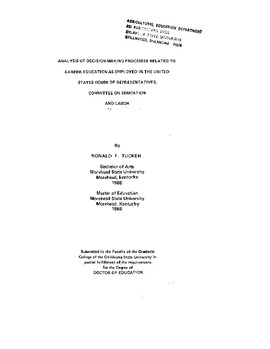| dc.contributor.advisor | Price, Robert R. | |
| dc.contributor.author | Tucker, Ronald Francis | |
| dc.date.accessioned | 2016-02-24T15:26:29Z | |
| dc.date.available | 2016-02-24T15:26:29Z | |
| dc.date.issued | 1974-05 | |
| dc.identifier.uri | https://hdl.handle.net/11244/31452 | |
| dc.description.abstract | Scope and Method of Study: The scope of the study was macroscopic in its overview of the basic sociopolitical patterns of a large governmental body and microscopic in its analysis of decision-making processes in a legislative body. The research was more specifically concerned with career education and its dependency upon the inter-related and complex workings of the committee as a whole. | |
| dc.description.abstract | Both qualitative and quantitative systems of research were used. The qualitative research covered a five-month period of direct field observation in the United States House of Representatives, Committee on Education and Labor in Washington, D.C. The researcher's internship was sponsored by Committee Chairman, Carl Dewey Perkins of Kentucky. Data was obtained by observations of deliberations and actions of' the Committee membership. Post actions of the Committee were also included and studied in order to identify residual effects of the power structure. Interviews were made within the membership to ascertain self-identity and role perception as related to support for career education. | |
| dc.description.abstract | Quantitative methods of research included comparative legislative activities as drawn from the 89th and 92nd Congressional Records, vital statistics of membership, key committee membership voting, voting patterns on major educational and labor bills, parliamentary hierarchy of the committee, constituents responses as expressed in interviews, and major educational goals as perceived by the membership. | |
| dc.description.abstract | Findings and Conclusions: Any decision concerning career education made by the Committee on Education and Labor is the end result of a complex process, resulting in agreement between the President, the committee, and the Congress. These forces, before reaching their own individual decisions, have had to weigh and consider the wishes of their constituents, the pressures of various lobbies, and the legal ramifications. The research procedure resulted in the following findings: career education is not seen as a priority item by committee membership; many of the membership felt career and vocational education are synonymous or did not understand the concept of career education. Presently there is no specific group lobbying for career education. The future success of career education lies on the local or state level through revenue sharing or block grants. Funding is an acceptable procedure of the committee, but is highly dependent upon special needs for the underprivileged and needy. | |
| dc.description.abstract | Further, the guidance counselor must improve and play a key role in the implementation of career education, and career education must expand to include a large portion of the out-of-school population. Other findings related more specifically to the committee's organization and functions lead to the conclusion that presently the committee chairman, Carl D. Perkins, is the dominating force. However, the President and Executive Branch has the most influence on total legislation; of utmost importance among most members was effective and significant legislation for education and the good of the country as a whole. Partisan differences account for major conflicts in committee decisions, seniority is a prominent force among membership, and minority leadership is highly significant within the committee. | |
| dc.description.abstract | The investigation provided a procedural basis for collecting explanatory data of this type. The investigation also illustrated that an exact methodical research procedure involving numerative and statistical methods is impossible and impractical. | |
| dc.description.abstract | If career education is to become a viable working concept it must be understood by committee membership so they will implement the necessary legislation for the overall good of career education and for the Nation. | |
| dc.format | application/pdf | |
| dc.language | en_US | |
| dc.rights | Copyright is held by the author who has granted the Oklahoma State University Library the non-exclusive right to share this material in its institutional repository. Contact Digital Library Services at lib-dls@okstate.edu or 405-744-9161 for the permission policy on the use, reproduction or distribution of this material. | |
| dc.title | Analysis of decision-making processes related to career education as employed in the United States house of representatives, committee on education and labor | |
| dc.contributor.committeeMember | Key, James P. | |
| dc.contributor.committeeMember | St. Clair, James Kenneth | |
| dc.contributor.committeeMember | Wiggins, Lloyd | |
| dc.contributor.committeeMember | Arquitt, George E., Jr. | |
| osu.filename | Thesis-1973D-T893a.pdf | |
| osu.accesstype | Open Access | |
| dc.type.genre | Dissertation | |
| dc.type.material | Text | |
| thesis.degree.discipline | Vocational Technical and Career Education | |
| thesis.degree.grantor | Oklahoma State University | |
